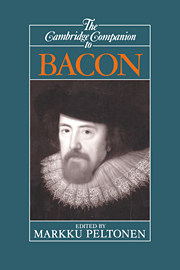Book contents
- Frontmatter
- Introduction
- 1 Bacon's idea of science
- 2 Bacon's classification of knowledge
- 3 Bacon's method of science
- 4 Bacon's forms and the maker's knowledge tradition
- 5 Bacon's speculative philosophy
- 6 Bacon as an advocate for cooperative scientific research
- 7 Bacon's science and religion
- 8 Bacon and rhetoric
- 9 Bacon and history
- 10 Bacon's moral philosophy
- 11 Bacon's political philosophy
- 12 Bacon's legacy
- Bibliography
- Index
9 - Bacon and history
Published online by Cambridge University Press: 28 May 2006
- Frontmatter
- Introduction
- 1 Bacon's idea of science
- 2 Bacon's classification of knowledge
- 3 Bacon's method of science
- 4 Bacon's forms and the maker's knowledge tradition
- 5 Bacon's speculative philosophy
- 6 Bacon as an advocate for cooperative scientific research
- 7 Bacon's science and religion
- 8 Bacon and rhetoric
- 9 Bacon and history
- 10 Bacon's moral philosophy
- 11 Bacon's political philosophy
- 12 Bacon's legacy
- Bibliography
- Index
Summary
In the De augmentis, Bacon divides the kinds of learning into three primary categories - history, poetry, and philosophy - which correspond to the three faculties of the rational soul - memory, imagination, and reason. He then divides history into two kinds - civil and natural - each of which is further subdivided into subcategories (IV, 292-300). History is not only given a very wide domain in Bacon's division of knowledges, but because he identifies historia with experientia, its role in his inductive philosophy is also fundamental: of the reconstruction of the sciences, he claims, “the foundation must be laid in natural history” (IV, 28). As for civil history, Bacon claims that its “dignity and authority are pre-eminent among human writings. For to its fidelity are entrusted the examples of our ancestors, the vicissitudes of things, the foundations of civil policy, and the name and reputation of men” (IV, 302).
- Type
- Chapter
- Information
- The Cambridge Companion to Bacon , pp. 232 - 259Publisher: Cambridge University PressPrint publication year: 1996
- 4
- Cited by

